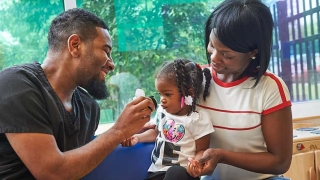PriCARE Offers Support For Families During COVID
Published on
Published on
 Since 2014, the PriCARE Parenting Program has offered a free, six-week group intervention for caregivers of young children ages 2-6 years old. Hosted within the primary care setting, the Child Adult Relationship Enhancement in Pediatric Primary Care (PriCARE) program was designed to strengthen caregiver-child relationships, improve child behaviors, decrease parenting stress and reduce risk of child maltreatment. Each group is facilitated by highly experienced trainers who use hands-on activities, role-playing, brainstorming and take-home practice review in order to teach the curriculum. Topics covered include understanding children’s behaviors, the importance of play, how to shape behaviors with positive attention and giving effective commands in order to increase compliance. Caregivers are given handouts at each session, including worksheets for homework activities in between sessions.
Since 2014, the PriCARE Parenting Program has offered a free, six-week group intervention for caregivers of young children ages 2-6 years old. Hosted within the primary care setting, the Child Adult Relationship Enhancement in Pediatric Primary Care (PriCARE) program was designed to strengthen caregiver-child relationships, improve child behaviors, decrease parenting stress and reduce risk of child maltreatment. Each group is facilitated by highly experienced trainers who use hands-on activities, role-playing, brainstorming and take-home practice review in order to teach the curriculum. Topics covered include understanding children’s behaviors, the importance of play, how to shape behaviors with positive attention and giving effective commands in order to increase compliance. Caregivers are given handouts at each session, including worksheets for homework activities in between sessions.
In early March, the PriCARE program was among many CHOP programs that came to an abrupt halt due to the COVID-19 pandemic. During those initial weeks, it became evident that the economic crisis, social isolation, loss of social supports and closures of childcare facilities and schools in the setting of the quarantine had all placed increased stress on caregivers. A survey of parents found increased reports of parenting stress and utilization of harsh parenting methods since the start of the pandemic. Public health professionals began voicing concerns regarding possible increases in stricter parenting, child abuse and intimate partner violence as a result of the pandemic. The PriCARE team quickly brainstormed mechanisms for providing ongoing support to their families during this difficult and uncertain time.
The program team, with the financial support from the CHOP COVID-19 Response Grant Program, adapted their in-person group sessions to create Virtual PriCARE, led by Dr. Joanne Wood (Principal Investigator), Devon Kratchman (Clinical Research Coordinator) and Emily DePaul (PriCARE Trainer). The pilot program currently provides a 6-week virtual positive parenting intervention through a secure video conferencing platform to a small group of caregivers. It provides families with the necessary skills to add positivity into their relationship with their children, reduce their stress and lower risk for harsh parenting. The adapted intervention also includes tips for using the PriCARE skills to mediate the challenges posed by social distancing and remote schooling and work.
To date, the pilot virtual program has hosted a total of 39 sessions (five complete 6-week groups and two ongoing groups), reaching more than 40 families. Their experience transitioning from in-person to virtual has been both challenging and exciting. The team quickly reformatted the curriculum to teach virtually, trained team members on the technology and new curriculum, helped caregivers troubleshoot technical issues and implemented new strategies for increasing engagement. They are eager to continue improving virtual delivery of PriCARE based on caregiver feedback and program evaluation.
Overall, the transition to a virtual platform has been smoother than the team anticipated and the program has received positive feedback from both the families and the facilitating trainers. Caregivers have stated that PriCARE was “very helpful in managing challenging behaviors” and that it was “really helpful to role play and get feedback on parenting techniques.” After participating in PriCARE, caregivers have stated they better “understand behavior in children,” know effective ways “to use direct commands so [their child] complies more often,” and recognize how to use one-on-one play time as a “technique to better their relationship” with their child.
The program plans to continue hosting virtual sessions for the foreseeable future, and perhaps beyond the pandemic. Families now have access to technology more than ever and this increased accessibility has helped decrease barriers many caregivers encountered when attempting to attend the in-person sessions. Additionally, the PriCARE team is planning to pilot the virtual intervention in Spanish to expand their reach. The hope is to start training a new set of trainers and begin recruiting families in October.
To learn more about PriCARE, visit the following PolicyLab Blog.
In this episode, Emily DePaul, MPH, MAC, and Linda McWhorter, PhD, talk about positive parenting during a pandemic and the PriCARE Parenting Program, which focuses on providing a toolbox of parenting techniques to increase positive behavior and build a strong caregiver-child relationship. They offer advice and tools to help address some of the common concerns and challenges parents are facing during COVID-19. Published May 2020.